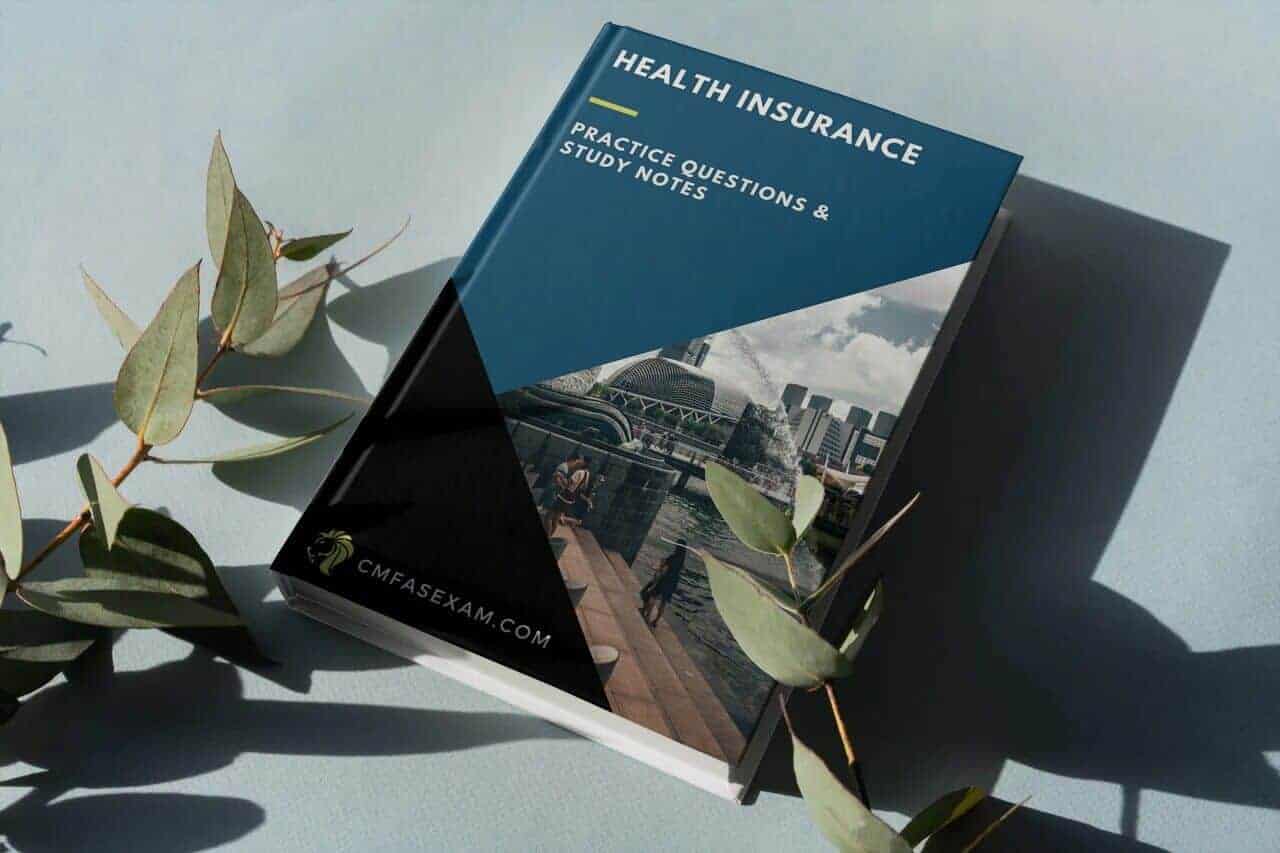CMFAS Health Insurance (HI) Exam Free Trial
Let us do all the heavy works so that you can study efficiently.
Quiz-summary
0 of 30 questions completed
Questions:
- 1
- 2
- 3
- 4
- 5
- 6
- 7
- 8
- 9
- 10
- 11
- 12
- 13
- 14
- 15
- 16
- 17
- 18
- 19
- 20
- 21
- 22
- 23
- 24
- 25
- 26
- 27
- 28
- 29
- 30
Information
Chapter 9 Common Policy Provisions
1. Introduction
2. Sections Of A Policy Contract
3. Policy Schedule
4. Insuring Clause & Definitions
5. General Conditions
You have already completed the quiz before. Hence you can not start it again.
Quiz is loading…
You must sign in or sign up to start the quiz.
You have to finish following quiz, to start this quiz:
Results
0 of 30 questions answered correctly
Your time:
Time has elapsed
You have reached 0 of 0 points, (0)
Categories
- Not categorized 0%
- 1
- 2
- 3
- 4
- 5
- 6
- 7
- 8
- 9
- 10
- 11
- 12
- 13
- 14
- 15
- 16
- 17
- 18
- 19
- 20
- 21
- 22
- 23
- 24
- 25
- 26
- 27
- 28
- 29
- 30
- Answered
- Review
-
Question 1 of 30
1. Question
What is the purpose of the Insuring Clause in an insurance policy?
Correct
Explanation: The Insuring Clause is a crucial part of an insurance policy as it explicitly outlines the covered perils and risks. It defines the scope of the insurance coverage, detailing what specific events or circumstances are protected under the policy.
Incorrect
Explanation: The Insuring Clause is a crucial part of an insurance policy as it explicitly outlines the covered perils and risks. It defines the scope of the insurance coverage, detailing what specific events or circumstances are protected under the policy.
-
Question 2 of 30
2. Question
In the context of insurance policies, what does the Policy Schedule typically include?
Correct
Explanation: The Policy Schedule provides a snapshot of key policy information, including premium payment details, coverage amounts, and effective dates. It serves as a quick reference guide for policyholders.
Incorrect
Explanation: The Policy Schedule provides a snapshot of key policy information, including premium payment details, coverage amounts, and effective dates. It serves as a quick reference guide for policyholders.
-
Question 3 of 30
3. Question
What are General Conditions in an insurance policy?
Correct
Explanation: General Conditions are standardized terms and conditions that apply to the entire insurance policy. They set forth the rights and obligations of both the insurer and the policyholder, ensuring consistency throughout the policy.
Incorrect
Explanation: General Conditions are standardized terms and conditions that apply to the entire insurance policy. They set forth the rights and obligations of both the insurer and the policyholder, ensuring consistency throughout the policy.
-
Question 4 of 30
4. Question
During a policy term, an insured event occurs, and the policyholder promptly notifies the insurer. What is the insurer’s obligation under General Conditions?
Correct
Explanation: General Conditions typically require insurers to promptly and fairly investigate claims made by policyholders. This ensures that the policyholder receives a fair assessment of their claim in a timely manner.
Incorrect
Explanation: General Conditions typically require insurers to promptly and fairly investigate claims made by policyholders. This ensures that the policyholder receives a fair assessment of their claim in a timely manner.
-
Question 5 of 30
5. Question
Which section of an insurance policy contract defines key terms used throughout the policy?
Correct
Explanation: The Definitions Section in an insurance policy contract provides explicit definitions for key terms used throughout the policy. This section helps avoid ambiguity and ensures a clear understanding of the terms within the context of the policy.
Incorrect
Explanation: The Definitions Section in an insurance policy contract provides explicit definitions for key terms used throughout the policy. This section helps avoid ambiguity and ensures a clear understanding of the terms within the context of the policy.
-
Question 6 of 30
6. Question
Mr. X is reviewing his insurance policy and comes across a provision that excludes coverage for intentional acts. In which section of the policy is Mr. X likely to find this information?
Correct
Explanation: Exclusions, such as those for intentional acts, are typically listed in a dedicated section of the policy known as the Exclusions Section. This section specifies situations or events that are not covered by the policy.
Incorrect
Explanation: Exclusions, such as those for intentional acts, are typically listed in a dedicated section of the policy known as the Exclusions Section. This section specifies situations or events that are not covered by the policy.
-
Question 7 of 30
7. Question
What is the primary purpose of the Introduction section in an insurance policy?
Correct
Explanation: The Introduction section in an insurance policy serves to set the tone and purpose of the policy. It provides an overview of the policy’s intent and scope, giving the policyholder an introduction to the coverage.
Incorrect
Explanation: The Introduction section in an insurance policy serves to set the tone and purpose of the policy. It provides an overview of the policy’s intent and scope, giving the policyholder an introduction to the coverage.
-
Question 8 of 30
8. Question
During a policy term, the insured loses the policy document. Where can the insured find a summary of the policy details?
Correct
Explanation: In the event of losing the policy document, the insured can find a summary of the policy details in the Policy Schedule. This section contains key information such as coverage amounts, effective dates, and premium payment details.
Incorrect
Explanation: In the event of losing the policy document, the insured can find a summary of the policy details in the Policy Schedule. This section contains key information such as coverage amounts, effective dates, and premium payment details.
-
Question 9 of 30
9. Question
What role does the Definitions Section play in an insurance policy?
Correct
Explanation: The Definitions Section in an insurance policy is responsible for defining key terms used throughout the policy. This helps ensure a common understanding of terminology between the insurer and the policyholder.
Incorrect
Explanation: The Definitions Section in an insurance policy is responsible for defining key terms used throughout the policy. This helps ensure a common understanding of terminology between the insurer and the policyholder.
-
Question 10 of 30
10. Question
In the context of insurance policies, what is the purpose of the Common Policy Provisions?
Correct
Explanation: Common Policy Provisions are designed to standardize policy language and structure, promoting consistency across insurance policies. This helps facilitate clear communication and understanding between insurers and policyholders.
Incorrect
Explanation: Common Policy Provisions are designed to standardize policy language and structure, promoting consistency across insurance policies. This helps facilitate clear communication and understanding between insurers and policyholders.
-
Question 11 of 30
11. Question
Mrs. Y’s insurance policy is up for renewal, and she wants to make changes to her coverage. Where is she likely to find information about the renewal process and any required actions?
Correct
Explanation: Information about the renewal process and any required actions is typically found in the Renewal Conditions section within the General Conditions of the insurance policy. This section outlines the procedures and terms for policy renewal.
Incorrect
Explanation: Information about the renewal process and any required actions is typically found in the Renewal Conditions section within the General Conditions of the insurance policy. This section outlines the procedures and terms for policy renewal.
-
Question 12 of 30
12. Question
In the event of a dispute between the policyholder and the insurer regarding claim settlement, what section of the policy is likely to address the resolution process?
Correct
Explanation: The General Conditions section of an insurance policy often includes provisions related to dispute resolution between the policyholder and the insurer. It outlines the steps and processes for resolving conflicts.
Incorrect
Explanation: The General Conditions section of an insurance policy often includes provisions related to dispute resolution between the policyholder and the insurer. It outlines the steps and processes for resolving conflicts.
-
Question 13 of 30
13. Question
Under what circumstances might the insurer have the right to cancel an insurance policy?
Correct
Explanation: The insurer typically has the right to cancel an insurance policy if the insured engages in fraud or misrepresentation. This action helps maintain the integrity of the insurance contract.
Incorrect
Explanation: The insurer typically has the right to cancel an insurance policy if the insured engages in fraud or misrepresentation. This action helps maintain the integrity of the insurance contract.
-
Question 14 of 30
14. Question
What purpose does the Exclusions Section serve in an insurance policy?
Correct
Explanation: The Exclusions Section in an insurance policy explicitly lists situations or events that are not covered by the policy. It helps clarify the boundaries of coverage and informs the policyholder about specific circumstances where coverage is not provided.
Incorrect
Explanation: The Exclusions Section in an insurance policy explicitly lists situations or events that are not covered by the policy. It helps clarify the boundaries of coverage and informs the policyholder about specific circumstances where coverage is not provided.
-
Question 15 of 30
15. Question
What is the primary function of the Policy Schedule?
Correct
Explanation: The Policy Schedule serves as a quick reference guide for policy details, summarizing key information such as coverage amounts, effective dates, and premium payment details in a concise format.
Incorrect
Explanation: The Policy Schedule serves as a quick reference guide for policy details, summarizing key information such as coverage amounts, effective dates, and premium payment details in a concise format.
-
Question 16 of 30
16. Question
During a policy term, the insured makes changes to their property that may impact the insurance coverage. What is the insured’s obligation under General Conditions?
Correct
Explanation: General Conditions often require the insured to inform the insurer promptly about any material changes to the insured property. This ensures that the coverage remains accurate and relevant to the insured’s situation.
Incorrect
Explanation: General Conditions often require the insured to inform the insurer promptly about any material changes to the insured property. This ensures that the coverage remains accurate and relevant to the insured’s situation.
-
Question 17 of 30
17. Question
What is the purpose of the Policy Schedule in an insurance policy contract?
Correct
Explanation: The Policy Schedule serves as a summary of the insurance policy, outlining important details such as the insured’s name, policy number, coverage limits, deductibles, and endorsements. It provides a quick reference for the policyholder to understand the scope of coverage and other essential policy details.
Incorrect
Explanation: The Policy Schedule serves as a summary of the insurance policy, outlining important details such as the insured’s name, policy number, coverage limits, deductibles, and endorsements. It provides a quick reference for the policyholder to understand the scope of coverage and other essential policy details.
-
Question 18 of 30
18. Question
In an insurance policy, what does the term “Insuring Clause” refer to?
Correct
Explanation: The Insuring Clause is the section of the insurance policy that explicitly states the perils or risks covered by the policy. It outlines the scope of coverage, providing clarity on the specific events or circumstances for which the insurer will provide compensation to the policyholder.
Incorrect
Explanation: The Insuring Clause is the section of the insurance policy that explicitly states the perils or risks covered by the policy. It outlines the scope of coverage, providing clarity on the specific events or circumstances for which the insurer will provide compensation to the policyholder.
-
Question 19 of 30
19. Question
Which of the following is an example of a General Condition in an insurance policy?
Correct
Explanation: General Conditions in an insurance policy include provisions that apply to all sections of the policy. The insured’s duty to mitigate damages after a loss is a common general condition, outlining the policyholder’s obligation to take reasonable steps to minimize the extent of a covered loss, thereby reducing the insurer’s liability.
Incorrect
Explanation: General Conditions in an insurance policy include provisions that apply to all sections of the policy. The insured’s duty to mitigate damages after a loss is a common general condition, outlining the policyholder’s obligation to take reasonable steps to minimize the extent of a covered loss, thereby reducing the insurer’s liability.
-
Question 20 of 30
20. Question
Mr. X, a policyholder, has experienced a covered loss. According to the policy provisions, what should Mr. X do to fulfill his duty after the loss?
Correct
Explanation: In the event of a covered loss, the policyholder has a duty to take prompt action to prevent further damage. This may include securing the property, notifying relevant authorities, and safeguarding the assets covered under the policy. Fulfilling this duty demonstrates responsible behavior and helps minimize the impact of the loss.
Incorrect
Explanation: In the event of a covered loss, the policyholder has a duty to take prompt action to prevent further damage. This may include securing the property, notifying relevant authorities, and safeguarding the assets covered under the policy. Fulfilling this duty demonstrates responsible behavior and helps minimize the impact of the loss.
-
Question 21 of 30
21. Question
What is the primary function of the Definitions section in an insurance policy?
Correct
Explanation: The Definitions section of an insurance policy serves the crucial role of clarifying the meanings of specific terms and phrases used within the policy contract. This ensures that both the insurer and the policyholder have a clear and consistent understanding of the terminology, minimizing potential misinterpretations or disputes.
Incorrect
Explanation: The Definitions section of an insurance policy serves the crucial role of clarifying the meanings of specific terms and phrases used within the policy contract. This ensures that both the insurer and the policyholder have a clear and consistent understanding of the terminology, minimizing potential misinterpretations or disputes.
-
Question 22 of 30
22. Question
In an insurance policy, what does the term “Subrogation” typically refer to?
Correct
Explanation: Subrogation is the legal doctrine that enables the insurance company, after paying a claim, to pursue recovery from a third party who may have caused the loss or is otherwise responsible for the damages. This provision allows the insurer to mitigate its losses by seeking reimbursement from the at-fault party.
Incorrect
Explanation: Subrogation is the legal doctrine that enables the insurance company, after paying a claim, to pursue recovery from a third party who may have caused the loss or is otherwise responsible for the damages. This provision allows the insurer to mitigate its losses by seeking reimbursement from the at-fault party.
-
Question 23 of 30
23. Question
Which of the following statements accurately describes the purpose of a Waiver of Premium provision in an insurance policy?
Correct
Explanation: A Waiver of Premium provision is designed to provide relief to the policyholder in the event of a specified disability or incapacitation. This provision temporarily suspends the requirement for the policyholder to pay premiums while the disability persists, ensuring continuous coverage during the challenging period.
Incorrect
Explanation: A Waiver of Premium provision is designed to provide relief to the policyholder in the event of a specified disability or incapacitation. This provision temporarily suspends the requirement for the policyholder to pay premiums while the disability persists, ensuring continuous coverage during the challenging period.
-
Question 24 of 30
24. Question
Mr. Y is reviewing his insurance policy and notices a “Concealment or Fraud” provision. What is the significance of this provision for policyholders?
Correct
Explanation: The “Concealment or Fraud” provision addresses the policyholder’s obligation to provide accurate and truthful information to the insurer. It specifies the repercussions of intentional misrepresentation or concealment of material facts, which may result in voiding the policy or denial of claims. This provision emphasizes the importance of honesty and transparency in the insurance relationship.
Incorrect
Explanation: The “Concealment or Fraud” provision addresses the policyholder’s obligation to provide accurate and truthful information to the insurer. It specifies the repercussions of intentional misrepresentation or concealment of material facts, which may result in voiding the policy or denial of claims. This provision emphasizes the importance of honesty and transparency in the insurance relationship.
-
Question 25 of 30
25. Question
What is the primary function of the Definitions section in an insurance policy?
Correct
Explanation: The Definitions section of an insurance policy serves the crucial role of clarifying the meanings of specific terms and phrases used within the policy contract. This ensures that both the insurer and the policyholder have a clear and consistent understanding of the terminology, minimizing potential misinterpretations or disputes.
Incorrect
Explanation: The Definitions section of an insurance policy serves the crucial role of clarifying the meanings of specific terms and phrases used within the policy contract. This ensures that both the insurer and the policyholder have a clear and consistent understanding of the terminology, minimizing potential misinterpretations or disputes.
-
Question 26 of 30
26. Question
In an insurance policy, what does the term “Subrogation” typically refer to?
Correct
Explanation: Subrogation is the legal doctrine that enables the insurance company, after paying a claim, to pursue recovery from a third party who may have caused the loss or is otherwise responsible for the damages. This provision allows the insurer to mitigate its losses by seeking reimbursement from the at-fault party.
Incorrect
Explanation: Subrogation is the legal doctrine that enables the insurance company, after paying a claim, to pursue recovery from a third party who may have caused the loss or is otherwise responsible for the damages. This provision allows the insurer to mitigate its losses by seeking reimbursement from the at-fault party.
-
Question 27 of 30
27. Question
Which of the following statements accurately describes the purpose of a Waiver of Premium provision in an insurance policy?
Correct
Explanation: A Waiver of Premium provision is designed to provide relief to the policyholder in the event of a specified disability or incapacitation. This provision temporarily suspends the requirement for the policyholder to pay premiums while the disability persists, ensuring continuous coverage during the challenging period.
Incorrect
Explanation: A Waiver of Premium provision is designed to provide relief to the policyholder in the event of a specified disability or incapacitation. This provision temporarily suspends the requirement for the policyholder to pay premiums while the disability persists, ensuring continuous coverage during the challenging period.
-
Question 28 of 30
28. Question
Mr. Y is reviewing his insurance policy and notices a “Concealment or Fraud” provision. What is the significance of this provision for policyholders?
Correct
Explanation: The “Concealment or Fraud” provision addresses the policyholder’s obligation to provide accurate and truthful information to the insurer. It specifies the repercussions of intentional misrepresentation or concealment of material facts, which may result in voiding the policy or denial of claims. This provision emphasizes the importance of honesty and transparency in the insurance relationship.
Incorrect
Explanation: The “Concealment or Fraud” provision addresses the policyholder’s obligation to provide accurate and truthful information to the insurer. It specifies the repercussions of intentional misrepresentation or concealment of material facts, which may result in voiding the policy or denial of claims. This provision emphasizes the importance of honesty and transparency in the insurance relationship.
-
Question 29 of 30
29. Question
In an insurance policy, what does the term “Insuring Clause” refer to?
Correct
Explanation:
The Insuring Clause is a fundamental part of an insurance policy that explicitly states the insurer’s commitment to providing coverage for specified risks. It outlines the scope of coverage and defines the perils or events for which the policyholder is protected. This clause serves as the foundation of the insurance agreement.Incorrect
Explanation:
The Insuring Clause is a fundamental part of an insurance policy that explicitly states the insurer’s commitment to providing coverage for specified risks. It outlines the scope of coverage and defines the perils or events for which the policyholder is protected. This clause serves as the foundation of the insurance agreement. -
Question 30 of 30
30. Question
What role does the “General Conditions” section play in an insurance policy?
Correct
Explanation:
The General Conditions section in an insurance policy establishes the standard terms and provisions that apply across the entire contract. It includes conditions that both the insurer and the insured must adhere to, such as cancellation terms, policy territory, and other general rules governing the insurance agreement.Incorrect
Explanation:
The General Conditions section in an insurance policy establishes the standard terms and provisions that apply across the entire contract. It includes conditions that both the insurer and the insured must adhere to, such as cancellation terms, policy territory, and other general rules governing the insurance agreement.
Learn how you can reduce CMFAS Exam study time by 53% and achieve success completely for free
- Start Free practice questions set two
- Mistakes people make when preparing exam and how to avoid it
- When to know if you are ready for to take the exam
- How this one little trick can increase your pass rate by another 10% instantly
- How to remember what you studied without stressing yourself
- Why people with 20 years of working experience and a CFA, FRM holder failed the CMFAS exam
Why CMFASExam
Enormous Exam Bank
Large number of questions to help you memorize all possible exam content
Explanation Provided
Get detailed explanation right after each questions
Support All Devices
Support all tablets and handheld. Study anywhere
Until You Pass Guarantee
We are very confident with our product. Therefore all purchase comes with a success guarantee
Bonus Tips
Get the bonus article of: 17 Secret Tips To Improve CMFAS Study by 39%
Adhere to CMFAS Examination Format
All questions are adhered to the real examination format to simulate the real exam environment
Frequently Updated
Our exam bank is frequently updated by our examination team
Carefully Crafted
Each questions is carefully crafted by our exam specialist and adhere to the real question formats
Instant Access
No delivery time and fee is needed. Access immediately after payment




